Evelyn Ryan, Yourlifelifter
“We all have inalienable rights to pursue life, liberty and happiness. Absolutely we do. However, if we are prevented from pursuing them because we have damaged the only vessel that we have to travel in that journey, we are sabotaging not only our own health and happiness but also our children’s by teaching them the same maladaptive unhealthy thinking patterns and beliefs. And, frankly, we and our children all deserve so much better.”
The article, “The Damaging Effects of Living An Inauthentic Life and How to Change It,” by Tracey Crossley provides probably the most important lesson to adult survivors of childhood abuse on the damaging effects of childhood abuse.
This is why.
Because abuse survivors were punished in youth whenever their authentic selves emerged to protect and care for themselves and they were rewarded for being who their abusers wanted them to be to serve none other than the abusers.
We learned, as a result, at that moment in time when we were defenseless dependent children and our brains were in critical stages of development, to become inauthentic versions of ourselves in order to cope and respond to pain. We disconnected rather than integrated with ourselves emotionally, did not learn self-care and self-compassion, and learned to maladapt and rely on others who cause the pain (we think we deserve) to soothe the pain. As we took in too much pain and trauma, our bodies defensively repressed it, temporarily stored it away in our memory banks until we were more mature and better equipped to handle it.
As is described so eloquently in Tracy Crossley’s article, as we go out into the world and live our lives and develop relationships, go to school, and pursue our passions, we make decisions based on false perceptions and beliefs about the world and ourselves along with our unhealed trauma wounds. In the process, we never learn what the real things are that nurture OUR souls and OUR self-worth and that make US happy and how to pursue them. We end up neglecting our own needs and become overly dependent on other people to tell us what we are doing is worthy and we use, by default, their happiness to bring us happiness rather than sourcing that from within our own selves.
Let’s explore this not so obvious point a bit more.

Living Lies Cannot Sustain Us
Living lies just like physically abusing or neglecting our bodies cannot sustain us because our bodies were not designed to work that way. We are fighting nature by fooling ourselves and what will nature do? It will rebel and when it does, the consequences can be severe and for some irreversible. For every action, there is an equal and opposite reaction. So when you do not supply the body what it needs to function properly, it will attempt to take from somewhere else.
So if you do not provide the body the proper nourishment it needs to survive and sustain itself or you take in too many toxic substances or stress your body above what it was designed to do, the body cannot develop normally and visually, you look bad and physically and emotionally, you feel bad. You become physically and emotionally unfit.

Now for a while, the liver or body systems that are being taxed will filter out the crap and your natural defenses will take over until..wham! You have overtaxed them and they no longer are able to filter out the garbage faster than it is coming in or you have strained that vertebrae or ligament or muscle as far as it can be stretched. You experience emotional and physical pain. These are the cues that what you have been putting in the body is not sufficient to nourish and sustain it and you need to stop doing what you are doing and course correct.
So you could take an aspirin or an antacid or put on makeup or get false teeth or take high blood pressure medicine or cholesterol medicine that will mask the damage and temporarily relieve and sustain yourself, nevertheless until you provide your body the proper nutrition to care for it and ensure its works as it was designed, something will continue to give and you will continue to risk being at some level of pain and suffering.
How Overtaxing the Mind Starves Us of Emotional Nourishment

Equally, when you do not provide the mind what it needs to flourish or you overtax it and take in too much emotional toxicity or pain, the spirit will starve for nourishment and you will exceed the pain threshold your brain was designed to handle. Read more on nourishing our souls. The brain has remarkable plasticity but it is not good at spontaneous healing. The mind and spirit will become traumatized and malnourished and you will become emotionally fatigued, exhausted, stressed, or depressed. Sustained emotional stress also results in more physical damage to the body because the human body is comprised of integrated systems. Stress hormone levels rise for longer periods than the body is designed for leading to inflammation. The body responds with recognizing the inflammation as disease that the body’s immune system attacks. The neurological system is connected and interrelated to all the body’s systems, hence, healthy body, healthy mind and vice versa.
In essence, when you mess with nature, you mess with your own divine AUTHENTIC and integrated design. To be happy we have to learn and embrace a healthy life style that includes not only our emotional fitness but also our fitness related to our achievements and relationships and our physical health. Read more here.
Masking Pain Will Not Address It

And like an aspirin that provides temporary relief from physical pain, we can bandaid our emotional pain. Absolutely, we can. Doctors can label us with this condition or that and prescribe antidepressants or mood elevators or we can self-medicate with alcohol or illegal drugs or food or people and find many other creative ways to mask the pain and continue to be someone we are not and look to others, even abusers and manipulators, or things to define our worth and for instant relief and gratification. We can even deny it. The body when the trauma is too much for the mind to bear, even represses it. However, wounds that cannot be accessed cannot be healed. Some of us may even believe this works for us. That is until we get older and our liver or kidneys or heart or soul become stressed to capacity or until we face some major emotional catastrophe that tests our self-reliance, self-assurance, and coping skills. Then and for some, only then, do they experience the perfect storm and are faced with reality and like Dr. Phil says learn in the hardest and worst way that what they have done has not worked for them and has resulted in immeasurable and, for some, irreparable damage.

We all have inalienable rights to pursue life, liberty and happiness. Absolutely we do. However, if we are prevented from pursuing them because we have damaged the only vessel that we have to travel in that journey, we are sabotaging not only our own health and happiness but also our children’s by teaching them the same maladaptive unhealthy thinking patterns and beliefs. And, frankly, we and our children all deserve so much better.
How Abuse Makes Our Emotions Toxic
Let’s now look at abuse and how it impacts our abilities to regulate our emotions and engage in healthy relationships. Everyone who is abused is most likely not able to recognize the “good” in a healthy relationship because they never learned to relate good treatment to love and to defining their worthiness. The belief filters in abuse survivors become skewed. The magnitude of the damage depends on what “fears” are driving you as well. Read more in “Why Did I Get Involved with a Jerk and What Can I Do About It.”
Part of healing and building self-worth is learning what self-love is and what healthy loving relationships of reciprocity are. We are all born lovable however loving relationships are not an entitlement. They are worked for and earned based on honoring each other’s wants and needs in sickness and health and in good times and bad in a respectful manner beneficial to both parties. Emotionally intelligent and healthy individuals know this and live it. They are clear on their personal worth and lovability and the rules of healthy respectful human interactions.
When we are abused, our pain-based emotions become faulty and lose their intended design functions of being reliable protective safety measures and providing depth and color to our lives. They go haywire and rather than protect us, do us and our children more harm as we teach the same distorted thinking patterns to them as well. We and our children become vulnerable targets of energy and power vampires. Read more in How Emotions Go Haywire in Abuse Survivors.
Abuse victims can develop an exaggerated anger response due to suppressed emotions from routine invalidation and learned emotional helplessness. This can trigger a knee jerk aggressive anger response that can do us and others immense harm and cause us to sabotage our own recovery as we blame others for the discomfort we experience from our uncontrolled emotions. The response can be covertly or overtly aggressive rather than constructive. this does not mean we suppress our anger or our feelings. To the contrary, it means we can learn to recognize the emotional root causes that trigger the discomfort and the steps proactively and effectively communicate our discomfort, problem solve a solution to address it, and benefit from the experience rather than repetitively continue to harm ourselves and others and sabotage our recovery.

Don’t forget that in life, we move in the direction of, create in reality, and do what we believe to be true even if it is a lie and even if it does not serve us and harms us. That is what makes us get involved with abusers and not leave them on the spot. Our filters for screening out narcissistic jerks were damaged in childhood and most likely many other abusive power imbalanced relationships we have had in our lives.
The problem is that if we meet someone who is authentically a good person and who is NOT inflicting emotional pain on us and NOT pushing our fear and pain buttons, we are at risk of feeling unloved, unfulfilled and unworthy and then proceed to sabotage the “good” relationship to keep ourselves in our comfortable and familiar state of shame that, of course, while painful, we nevertheless “believe” we can handle better, say, than our fear of being betrayed and abandoned and do not believe we are worthy of anything better.
This is an excellent example of how abusive childhoods cause pain addictions and skewed beliefs in personal power that rule our lives that become “pain-seeking” and “pain-avoiding” rather than “joy-seeking” and “joy-filled” (e.g. joyful). While we do this unconsciously and not deliberately, these vulnerabilities make us susceptible to attacks from emotional predators and for a life of chronic unhappiness, unfulfilment, and emotional pain and fatigue.
“The problem is that if we meet someone who is authentically a good person and who is NOT inflicting emotional pain on us and NOT pushing our fear and pain buttons, we are at risk of feeling unloved, unfulfilled and unworthy and then proceed to sabotage the ‘good’ relationship to keep ourselves in our comfortable state of shame that, of course, while painful, we nevertheless ‘believe’ we can handle better than, say, our fear of being betrayed and abandoned and do not believe we are worthy of anything better.”
Let’s break this down a bit further as it applies to relationships. Do relationships with jerks bring you pain? Absolutely, however, it is pain that you associate with being lovable and a good person and believe you are powerless to and you do not believe you deserve better. You also in your childhood most likely developed codependency tendencies and learned to self-sacrifice for other people. Perhaps you are an empath with too much compassion and believe you must fix other’s problems before you take care of your own needs? Perhaps you never learned you are worthy of being happy and were rewarded only for taking care of other’s needs?
This maladaptive thinking is what keeps us vulnerable to abusers and how abuse makes our emotions become toxic to our own selves. We learn to maladapt and confuse self-worth with avoidance of pain rather than pursuing goals and relationships that bring us real joy. Our decisions become heavily based on our learned pain tolerances and perceived weaknesses rather than our personal value and power and worthiness of joy. We become attracted to power imbalanced relationships because we believe we should suffer to be lovable and can “handle” the shame and emotional pain from abuse better than our fear of abandonment from being alone. So a relationship with a “good” person would not be appealing to abuse survivors who would not relate being treating well to being lovable or worthy and would not be able to “see” the good in it and therefore, would perceive no value in it.
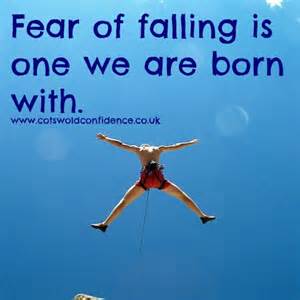
Here’s the good news!
We are only born with two fears: fear of falling and fear of loud noises. All others fears, pains, apprehensions, anxieties, phobia, bad habits? Well, those we learned. And just like we learned them, we can UNLEARN them.
I am committed here at Yourlifelifter and wrote Take Your Power Back to help you do exactly that and show you where to look to discover the real truth, facilitate your healing, and live as the joy-based authentic person you were put on this earth to be.

 We are not the source of our pain. No one is. We are the source of our joy. Read this again…and again…and again.
We are not the source of our pain. No one is. We are the source of our joy. Read this again…and again…and again. The truth is that we are all born and designed for happiness and to feel safe, secure, and lovable. When we are abused and betrayed in our youth when we are growing at such a rapid pace, our pain-based emotions, through overuse, become toxic and our beliefs about our self-worth and deserving peace, solace and joy become skewed. We are taught and conditioned, instead, to believe that in loving relationships, we deserve pain, we are the source of our pain, we are powerless to the pain, and only those who inflict pain on us have the power and authority to relieve the pain. We may not be able to see the “good” in normal healthy relationships and sabotage them because we were not taught to relate
The truth is that we are all born and designed for happiness and to feel safe, secure, and lovable. When we are abused and betrayed in our youth when we are growing at such a rapid pace, our pain-based emotions, through overuse, become toxic and our beliefs about our self-worth and deserving peace, solace and joy become skewed. We are taught and conditioned, instead, to believe that in loving relationships, we deserve pain, we are the source of our pain, we are powerless to the pain, and only those who inflict pain on us have the power and authority to relieve the pain. We may not be able to see the “good” in normal healthy relationships and sabotage them because we were not taught to relate  We can replace this distorted thinking with emotionally adaptive and healthy thinking and learn to modulate and control our own emotions and bring our self-esteem and self-worth to healthy levels. We can change our pain-seeking/pain-avoiding lives to joy-seeking/joy-filled lives, achieve emotional sobriety, and thrive. As we heal, our children will heal through us. This is how we break the cycles of intergenerational abuse.
We can replace this distorted thinking with emotionally adaptive and healthy thinking and learn to modulate and control our own emotions and bring our self-esteem and self-worth to healthy levels. We can change our pain-seeking/pain-avoiding lives to joy-seeking/joy-filled lives, achieve emotional sobriety, and thrive. As we heal, our children will heal through us. This is how we break the cycles of intergenerational abuse.
 You will take your power back and thrive. I explore these topics in much more depth in my book,
You will take your power back and thrive. I explore these topics in much more depth in my book,  Have you noticed that the most toxic people have the biggest and the most fragile egos?
Have you noticed that the most toxic people have the biggest and the most fragile egos? Now they cannot show their true colors to the world. Can they? How would they survive? How would they get others to give up the energy they starve for and need for emotional sustenance, for glue to mend their cracked psyches?
Now they cannot show their true colors to the world. Can they? How would they survive? How would they get others to give up the energy they starve for and need for emotional sustenance, for glue to mend their cracked psyches? create the magical illusion of power and grandeur and create their own “Land of Oz?” Why not commit the worst of “sins” in the name of God, America, or Buddha or Muhammed or for whatever reason or lie they can muster to justify what is really pure depravity and evil? Why not worship false idols – their own selves!
create the magical illusion of power and grandeur and create their own “Land of Oz?” Why not commit the worst of “sins” in the name of God, America, or Buddha or Muhammed or for whatever reason or lie they can muster to justify what is really pure depravity and evil? Why not worship false idols – their own selves! Now, evil lies on a long spectrum, however evil is evil. It is like being pregnant. You are or you aren’t and being a little bit is irrelevant to the greater purpose. So rather than work to become virtuous people of integrity and character and develop grace, tolerance, kindness, and generosity (which they loathe doing, by the way), these depraved people mask their weaknesses and prey on the vulnerabilities of others who truly are people of virtue.
Now, evil lies on a long spectrum, however evil is evil. It is like being pregnant. You are or you aren’t and being a little bit is irrelevant to the greater purpose. So rather than work to become virtuous people of integrity and character and develop grace, tolerance, kindness, and generosity (which they loathe doing, by the way), these depraved people mask their weaknesses and prey on the vulnerabilities of others who truly are people of virtue.
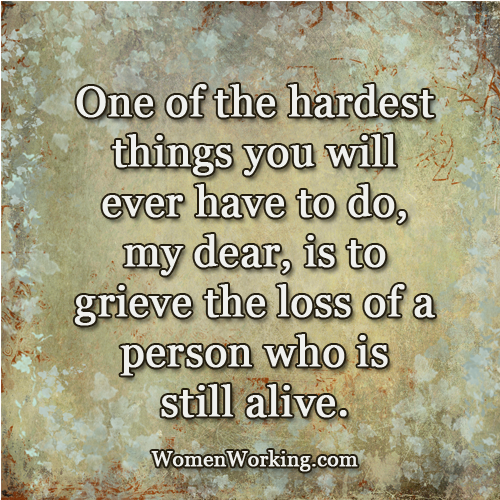

 Healing provides us a divine opportunity to become the authentic persons we were put on this earth to be and thrive. It is at this point that our painful pasts will no longer matter because we have broken our pain addictions and learned to provide our own selves the love and self-respect and self-assurance and self-care that we need to sustain us and thrive and the new found belief that we are worth the effort. We have learned to use our compassion responsibly and we can reliably decide what serves our hearts and souls even in our choices of paying respects when our attackers who we love or once loved have are dying or have died. Even if they are dying, their toxicity is not diminished, just their capacity to act on it. So their “death” or pending death sadly or fortunately (depends on how you choose to view it) essentially forces us into “No Contact” that supports our emotional healing and removes us from the harm from their toxicity.
Healing provides us a divine opportunity to become the authentic persons we were put on this earth to be and thrive. It is at this point that our painful pasts will no longer matter because we have broken our pain addictions and learned to provide our own selves the love and self-respect and self-assurance and self-care that we need to sustain us and thrive and the new found belief that we are worth the effort. We have learned to use our compassion responsibly and we can reliably decide what serves our hearts and souls even in our choices of paying respects when our attackers who we love or once loved have are dying or have died. Even if they are dying, their toxicity is not diminished, just their capacity to act on it. So their “death” or pending death sadly or fortunately (depends on how you choose to view it) essentially forces us into “No Contact” that supports our emotional healing and removes us from the harm from their toxicity.
 “Forgiveness is part of healing. It is not a prerequisite to healing. It is a point we reach when we understand and accept the truth about what happened to us from a position of emotional neutrality without the pain, blame and shame that our abusers shadowed on us.”
“Forgiveness is part of healing. It is not a prerequisite to healing. It is a point we reach when we understand and accept the truth about what happened to us from a position of emotional neutrality without the pain, blame and shame that our abusers shadowed on us.” 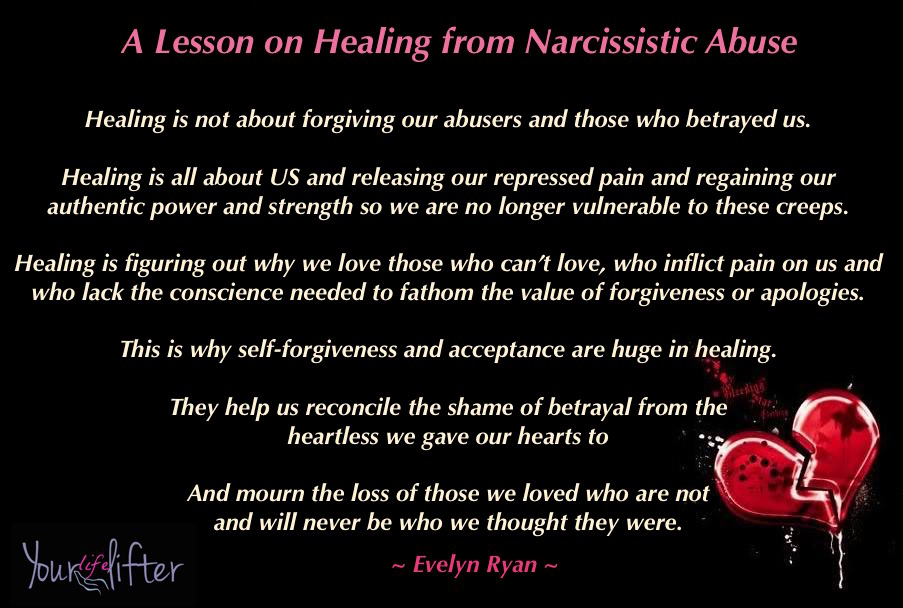 One attack, you may think, takes place in the conscious physical world – the other, in the metaphysical, the metacognitive world where we feel and think. However, the pain and shame and anger and fear and trauma we experience from a brutal physical or emotional brutal attack are the same. They inflict the same wounds and frequently open old ones. In addition, there are major differences to how we heal from the wounds. This is why.
One attack, you may think, takes place in the conscious physical world – the other, in the metaphysical, the metacognitive world where we feel and think. However, the pain and shame and anger and fear and trauma we experience from a brutal physical or emotional brutal attack are the same. They inflict the same wounds and frequently open old ones. In addition, there are major differences to how we heal from the wounds. This is why.
 beliefs and convictions. I agree with renowned author and therapist Dr. Alice Miller and others that we do not have to forgive and that forgiving our abusers is a personal choice. We can add a huge amount of emotional burden to an already painful situation by being told if we do not forgive, we punish ourselves twice..blah blah blah. This can leave us conflicted and feeling added guilt and even shame when we really do not want to forgive.
beliefs and convictions. I agree with renowned author and therapist Dr. Alice Miller and others that we do not have to forgive and that forgiving our abusers is a personal choice. We can add a huge amount of emotional burden to an already painful situation by being told if we do not forgive, we punish ourselves twice..blah blah blah. This can leave us conflicted and feeling added guilt and even shame when we really do not want to forgive. Healing, folks, has nothing to do with our abusers. Healing is, however, all about the victims. We are left to heal invisible wounds that were caused by our active but unaware participation in a very harming situation. Abuse survivors must work to turn their compassion and care inward and release the pain, trauma, shame, anger and fear that were projected onto them and inflicted on them by the emotional and conscienceless criminals, vampires, and thieves who also stole their identities. We, to heal, must not only release the pain and anger from the attack but also the shame from betrayal and of our unconscious complicity in the crime and our perceived foolery. This is why self-forgiveness and self-compassion are so important in healing. As Emily R., a community member at Yourlifelifter so eloquently stated, “forgiving a conscienceless person has absolutely zero meaning, thus, the real issue is learning to forgive oneself for not trusting oneself over their manipulative ploys of false promises and fake emoting.”
Healing, folks, has nothing to do with our abusers. Healing is, however, all about the victims. We are left to heal invisible wounds that were caused by our active but unaware participation in a very harming situation. Abuse survivors must work to turn their compassion and care inward and release the pain, trauma, shame, anger and fear that were projected onto them and inflicted on them by the emotional and conscienceless criminals, vampires, and thieves who also stole their identities. We, to heal, must not only release the pain and anger from the attack but also the shame from betrayal and of our unconscious complicity in the crime and our perceived foolery. This is why self-forgiveness and self-compassion are so important in healing. As Emily R., a community member at Yourlifelifter so eloquently stated, “forgiving a conscienceless person has absolutely zero meaning, thus, the real issue is learning to forgive oneself for not trusting oneself over their manipulative ploys of false promises and fake emoting.”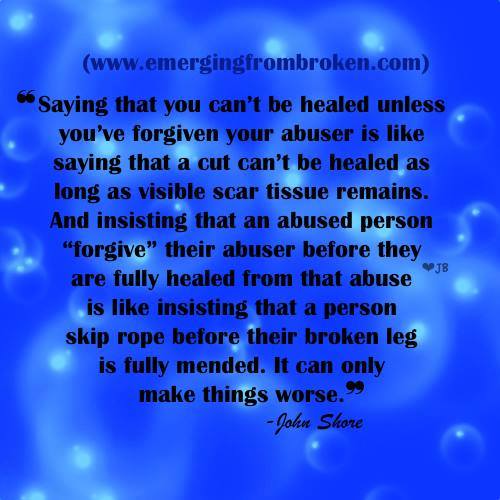 It is a point we reach when we understand and accept the truth about what happened
It is a point we reach when we understand and accept the truth about what happened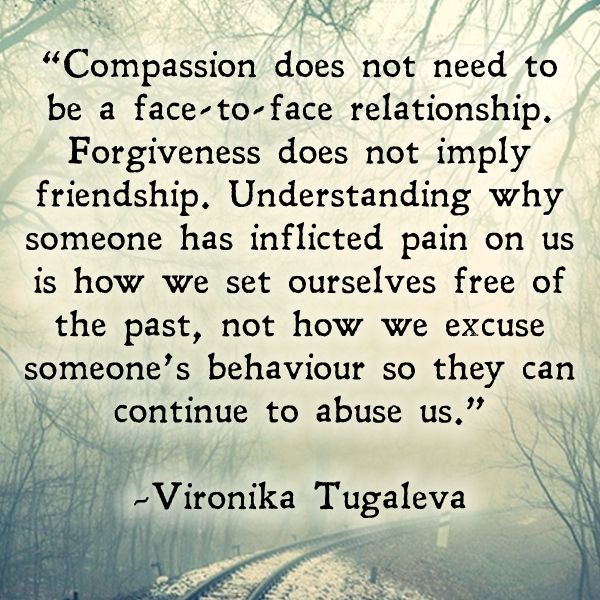 Healing is a process of self-discovery, self-analysis into the root causes of why we were victimized, addressing how our beliefs contributed to that, correcting our skewed beliefs, mourning our losses, building our self-worth as well as healing our trauma wounds. I personally believe, it is close to impossible to fully accept what happened to us and forgive ourselves for the part we played unless we first heal and recover from the trauma and then stop our faulty victim thinking. This requires fully understanding why we love people who inflict pain on us and why we are attracted to power imbalanced relationships.
Healing is a process of self-discovery, self-analysis into the root causes of why we were victimized, addressing how our beliefs contributed to that, correcting our skewed beliefs, mourning our losses, building our self-worth as well as healing our trauma wounds. I personally believe, it is close to impossible to fully accept what happened to us and forgive ourselves for the part we played unless we first heal and recover from the trauma and then stop our faulty victim thinking. This requires fully understanding why we love people who inflict pain on us and why we are attracted to power imbalanced relationships.
 Self-care and self-compassion are needed for healing because they “neutralize” the toxic emotions and empower ourselves to learn how to regulate our emotions again. These are good “habits” that relieve the pain and help us assimilate and reconnect with ourselves again. So, in effect self-care and self-compassion allow us an opportunity to witness our healing. They allow us to actively participate in our own healing and regain trust in ourselves and feel safe and secure in our own bodies. Self-care and self-compassion allow us to nourish our souls and are also critical to building self-worth, self-assurance and self-reliance and feel like “ourselves” again, not the pain addicted wounded versions who rely on abusers and manipulators who do not have our best interests at heart to alleviate our discomfort.
Self-care and self-compassion are needed for healing because they “neutralize” the toxic emotions and empower ourselves to learn how to regulate our emotions again. These are good “habits” that relieve the pain and help us assimilate and reconnect with ourselves again. So, in effect self-care and self-compassion allow us an opportunity to witness our healing. They allow us to actively participate in our own healing and regain trust in ourselves and feel safe and secure in our own bodies. Self-care and self-compassion allow us to nourish our souls and are also critical to building self-worth, self-assurance and self-reliance and feel like “ourselves” again, not the pain addicted wounded versions who rely on abusers and manipulators who do not have our best interests at heart to alleviate our discomfort. As you were growing up you may not have learned how to take good care of yourself. In fact, much of your attention may have been on taking care of others, on just getting by, or on “behaving well.” Perhaps you were even punished for thinking about and caring for yourself.
As you were growing up you may not have learned how to take good care of yourself. In fact, much of your attention may have been on taking care of others, on just getting by, or on “behaving well.” Perhaps you were even punished for thinking about and caring for yourself.
 Part of healing for those who were victims and continue to be susceptible to their attacks, then, is learning to maintain and protect your personal boundaries so you are not vulnerable to emotional predators.
Part of healing for those who were victims and continue to be susceptible to their attacks, then, is learning to maintain and protect your personal boundaries so you are not vulnerable to emotional predators. Ever heard “you shouldn’t feel that way” or “don’t feel that way” or my favorite, “get over it.” This is the single most damaging thing anyone could say to another human being. And this is why.
Ever heard “you shouldn’t feel that way” or “don’t feel that way” or my favorite, “get over it.” This is the single most damaging thing anyone could say to another human being. And this is why.
 Not having our emotions validated is called “invalidation.” It is the worst of abuse and the core of narcissistic abuse! If we grow up without having our emotions and feelings acknowledged regardless if we have the best of everything or not, we learn to suppress rather than trust and rely on our emotions. We learn to distrust rather than trust our internal protective mechanisms. We develop chronic uncertainty rather than confidence in our abilities that prevents us from reaching our true potential. We become reactive to situations and people and become dependent on others rather than ourselves to define our worth and soothe our discomfort. We become shame addicted and suffer from exaggerated self-loathing, self-hate, and self-sabotage. We believe falsely that we are the source and cause of our pain and believe we are powerless to alleviate it. This is all a lie!
Not having our emotions validated is called “invalidation.” It is the worst of abuse and the core of narcissistic abuse! If we grow up without having our emotions and feelings acknowledged regardless if we have the best of everything or not, we learn to suppress rather than trust and rely on our emotions. We learn to distrust rather than trust our internal protective mechanisms. We develop chronic uncertainty rather than confidence in our abilities that prevents us from reaching our true potential. We become reactive to situations and people and become dependent on others rather than ourselves to define our worth and soothe our discomfort. We become shame addicted and suffer from exaggerated self-loathing, self-hate, and self-sabotage. We believe falsely that we are the source and cause of our pain and believe we are powerless to alleviate it. This is all a lie!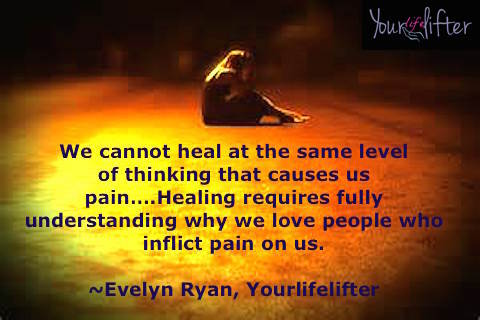 We cannot heal at the same level of thinking that causes and sustains our emotional pain! We become self-critical people pleasers with chronic low self-esteem and victim mentality. We not only
We cannot heal at the same level of thinking that causes and sustains our emotional pain! We become self-critical people pleasers with chronic low self-esteem and victim mentality. We not only 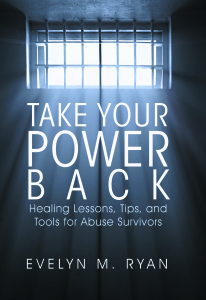
 The primary pain that we experience from abuse is shame. Abuse is betrayal of intimate trust. Abuse is abandonment. Unlike guilt, which is the result of feeling bad about what you do in the external world, shame reflects feelings of failure inside, as a person.
The primary pain that we experience from abuse is shame. Abuse is betrayal of intimate trust. Abuse is abandonment. Unlike guilt, which is the result of feeling bad about what you do in the external world, shame reflects feelings of failure inside, as a person.
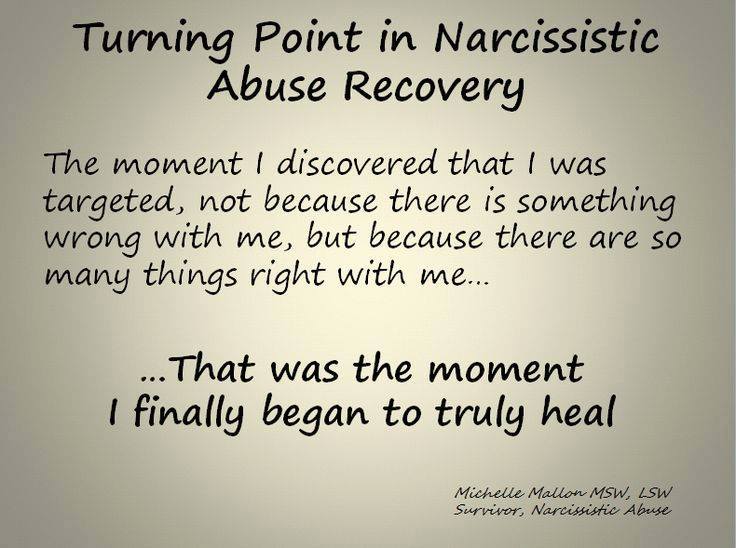 Are you compassionate? Empathetic?
Are you compassionate? Empathetic? and insightful and belong to the 40% of human beings who sense when something’s not right, who respond to their gut instinct, and who take action and speak up. They frequently like the child in the The Emperor’s New Clothes, will tell the truth and expose lies and wrong doing and are targets of scapegoaters, bullies, narcissists, and sociopaths who are driven by exaggerated envy and fear of shame, lack of compassion, and the inability to self sooth.
and insightful and belong to the 40% of human beings who sense when something’s not right, who respond to their gut instinct, and who take action and speak up. They frequently like the child in the The Emperor’s New Clothes, will tell the truth and expose lies and wrong doing and are targets of scapegoaters, bullies, narcissists, and sociopaths who are driven by exaggerated envy and fear of shame, lack of compassion, and the inability to self sooth. This inability to see the “bad” in others also significantly enhances their vulnerability to attacks from emotional vampires throughout their lives. As a result, empaths can be targeted easily by energy vampires such as scapegoaters, bullies, narcissists, and sociopaths who enlist other uncompassionate and apathetic people in their wrong-doing. So in actuality, abused children and adults in the world are some of the “nicest” people in the world. This is crazy making, folks, and is the heart of scapegoating and abuse in families and in my opinion, one of the main causes of evil in society today. The number one reason people seek counseling is because they were scapegoated as a child and suffer post traumatic distress. This is psychological trauma! Read on.
This inability to see the “bad” in others also significantly enhances their vulnerability to attacks from emotional vampires throughout their lives. As a result, empaths can be targeted easily by energy vampires such as scapegoaters, bullies, narcissists, and sociopaths who enlist other uncompassionate and apathetic people in their wrong-doing. So in actuality, abused children and adults in the world are some of the “nicest” people in the world. This is crazy making, folks, and is the heart of scapegoating and abuse in families and in my opinion, one of the main causes of evil in society today. The number one reason people seek counseling is because they were scapegoated as a child and suffer post traumatic distress. This is psychological trauma! Read on. Problems escalate for empaths, however, when apaths are in the vicinity. Empaths can be brought down, distressed and forced into the position of the lone fighter by the inaction of more apathetic types round them. This is also how school and work group bullying and scapegoating works. The bullies enlist the apathetic, fearful, and defenseless ones who are the ones most likely to go with the flow, to agree that the emperor/empress is wearing new clothes. Apaths behave defenselessly because they want to avoid unpleasant or harmful circumstances [including the bully turning on them]. Apathy is an avoidance strategy that contributes to abuse…by proxy!
Problems escalate for empaths, however, when apaths are in the vicinity. Empaths can be brought down, distressed and forced into the position of the lone fighter by the inaction of more apathetic types round them. This is also how school and work group bullying and scapegoating works. The bullies enlist the apathetic, fearful, and defenseless ones who are the ones most likely to go with the flow, to agree that the emperor/empress is wearing new clothes. Apaths behave defenselessly because they want to avoid unpleasant or harmful circumstances [including the bully turning on them]. Apathy is an avoidance strategy that contributes to abuse…by proxy! Kim Saeed, a narcissistic abuse recovery expert, says that narcissists prey on empaths and highly sensitive people. Empaths operate predominately from love, humility, and giving. They have a natural capacity for healing and teaching others. However, until they learn how to responsibly use those gifts, they are often taken advantage of…not only by romantic partners, but people in general. Further, empaths have a track record of developing codependent behaviors in childhood to deal with the overwhelming unfairness in the world and to please others, which they usually carry into their adult relationships. It is easy to see, then, how empaths who were abused as children can develop exaggerated codependency issues and dependence on others to define their worth.
Kim Saeed, a narcissistic abuse recovery expert, says that narcissists prey on empaths and highly sensitive people. Empaths operate predominately from love, humility, and giving. They have a natural capacity for healing and teaching others. However, until they learn how to responsibly use those gifts, they are often taken advantage of…not only by romantic partners, but people in general. Further, empaths have a track record of developing codependent behaviors in childhood to deal with the overwhelming unfairness in the world and to please others, which they usually carry into their adult relationships. It is easy to see, then, how empaths who were abused as children can develop exaggerated codependency issues and dependence on others to define their worth.